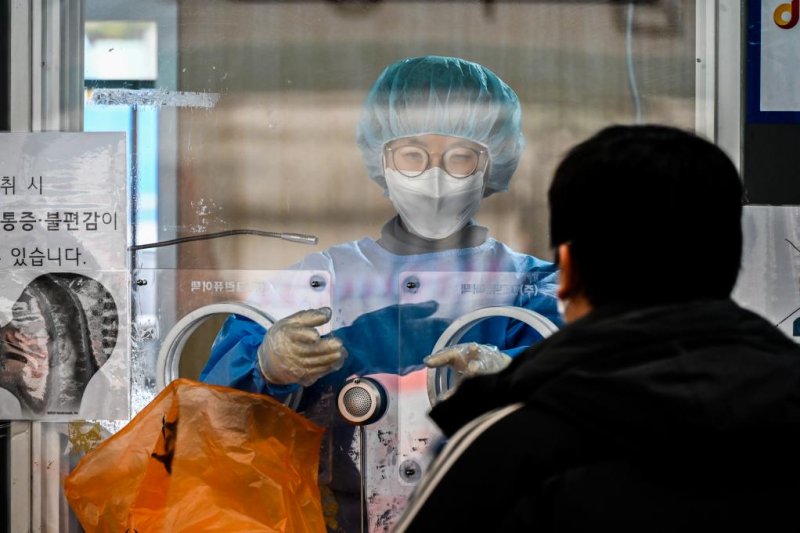1 of 9 | Clinics will begin moving toward rapid antigen tests for COVID-19, South Korea officials said, reserving PCR tests for the at-risk and the elderly. Photo by Thomas Maresca/UPI
SEOUL, Jan. 26 (UPI) -- South Korea recorded a single-day record for new COVID-19 cases on Wednesday, with a rise of more than 13,000 infections as health officials pivot to a new strategy for dealing with a surge driven by the more infectious Omicron variant.
The Korea Disease Control and Prevention Agency reported just over 13,000 new cases, an increase over the previous record of 8,571 infections that was set Tuesday. The Omicron variant has officially become the dominant strain in South Korea, accounting for 50.3% of cases last week, the country's health ministry said Monday.
Due to high vaccination rates and Omicron's relative mildness, however, South Korea is moving away from its highly centralized "3T" model -- test, trace and treat -- to a system that looks to preserve hospital bed capacity and limit disruptions to the economy.
"The pattern of the [Omicron] epidemic is different from the Delta epidemic, and the goal of antivirus management is also different," Prime Minister Kim Boo-kyum said at a COVID-19 task force meeting Wednesday. "From now on, the main goal of our antivirus response will be to reduce critical cases and deaths."
The new system was rolled out on Wednesday in four areas that have experienced high Omicron surges -- South Jeolla Province and the cities of Gwangju, Pyeongtaek and Anseong -- and local clinics are taking the lead in testing and treatment.
Kim said the approach "aims to minimize severe cases and deaths, prevent overload and collapse of the medical system and minimize socioeconomic damage." It will begin a gradual nationwide expansion on Saturday, he added.
In an effort to keep businesses and public services running, officials are shortening the isolation period for confirmed cases from 10 days to seven, provided the patient is fully vaccinated, and are no longer requiring close contacts of a confirmed case to quarantine. Other changes include a shift to rapid antigen tests, which can quickly detect large numbers of infections, while reserving more accurate but labor- and cost-intensive PCR tests for older and at-risk patients.
South Korea's health ministry has been working since November to move treatment of milder cases away from hospitals and specialized COVID-19 health facilities into the home.
"A home treatment system is crucial," Kim Seung-il, head of at-home treatment operations at the Ministry of Health and Welfare, told reporters on Tuesday. "Especially with Omicron, the high number of patients puts a strain on hospital resources."
South Korea has gone from just 34.1% of cases receiving at-home treatment in November to 68.8% as of this week, Kim said.
One public hospital in Anseong, a satellite city about 50 miles south of Seoul, has been running a pilot program since October in a model that could be replicated in other South Korea cities.
"What we have learned is that in order to fully utilize our medical resources, we also need to change our mindset," Lim Seong-gwan, director of Gyeonggi Provincial Medical Center Anseong Hospital, said during a tour of the hospital's facilities for reporters. "The guidelines we have may work today but not tomorrow, so we need to keep modifying our strategy."
Under the pilot program, at-home patients are given oximeters, thermometers and self-testing kits and check in two or three times a day over the phone with nurses and doctors. Those with more serious symptoms can visit a specialized outpatient clinic for consultations through protective glass and have diagnostic tests done by fully protected hospital staff.
The project is coordinated with the city government's health center, which acts as an initial triage location, and works with local transportation networks to provide secure taxis or shuttle buses for patients without their own vehicles.
"With this system, we can reduce duplication and work more efficiently," Lim said. "It improves safety and improves the efficiency of bed resources."
Health officials have said they are expecting Omicron-led infections to continue surging, with cases potentially topping 30,000 per day by next month.
More than 85% of South Korea's population is fully vaccinated, and over half have received a booster shot as of Wednesday, the KDCA said.
South Korea has also been quick to approve and import antiviral pills such as Pfizer's Paxlovid in order to treat mild and moderate cases. As of Wednesday, Seoul has secured Paxlovid pills for 762,000 patients and Merck's molnupiravir for 242,000.















